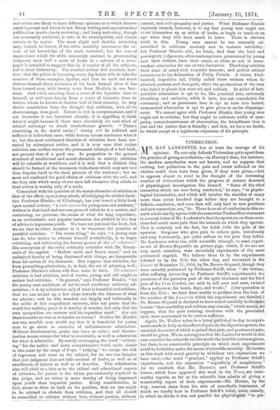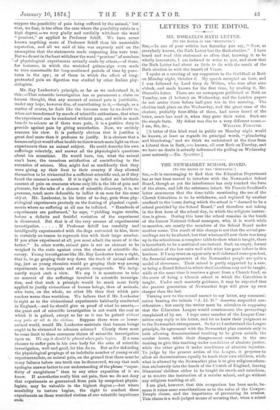VIVISECTION.
11,.. RAY LANKESTER has at least the courage of his opinions. He not only defends Vivisection quite apart from the practice of giving anm3thetics,—in Harvey's time, for instance, the modern anassthetics were not known, and we suppose that nothing but palliatives to the pain and terror inflicted on the victims could then have been given, if they were given,—but he appears almost to revel in the thought of the increasing number of vivisections which the progress of science demands of physiological investigators like himself. "Some of the chief researches which are now being conducted," he says, "in physio- logical laboratories, and which will involve the sacrifice of many more than seven hundred dogs before they are brought to a definite conclusion, and even then will only lead to new problems and new researches, are," &c. There is an air of exultation in this re- mark which hardly agrees with the somewhat Peckaniffian statement in a recent letter of Mr. Lankester's that the operators on these occa- sions feel much more pain than the animals on which they operate. That is certainly not the fact, for habit dulls the pain of the operator. Surgeons who give pain to relieve pain, notoriously and very fortunately, get quite callous to the pain they inflict. Mr. Lankester refers too, with scientific triumph, to some experi- ments of Brown-Sequard's on guinea-pigs, which, if we are not very much mistaken, were essentially experiments of the most protracted anguish. We believe them to be the experiments referred to by the Echo the other day, and recounted in the Lancet of December 11, 1858, by Dr. Brown-Sdquard, though they were actually performed by Professor Schiff, when "the victims, after suffering (according to Professor Schiff's experiments) the puncture of the posterior part of the optic thalamus and the hind part of the Crus Cerebri, are said to roll over and over, twisted like a corkscrew, for hours, days, and weeks.: (Our quotation is from the Echo ; we have been unable to procure even the loan of the number of the Lancet in which the experiments are detailed.) Dr. Brown-Sequard is declared to have stated carefully in the same lecture "that sensibility and volition may remain," which means, we suppose, that the poor twisting creatures with the punctured eyes, were ascertained to be serious sufferers.
Again, Dr. Walker refers in a letter published to-day to experi- ments made in Italy on the effects of pain on the digestive system, the essential character of which required that pain, and protracted pain, should be given. We do not suppose that Mr. Lankester would in this case conceive the scientific results worth the horrible tortures given, but there is no conceivable principle on which such experiments could be forbidden under his canon of scientific morality. He invites us this week with much gravity to withdraw two expressions we have used,—the word "prurient," applied to Professor Schiff's experiments, and the expression "superfluity of naughtiness." As we conclude that Mr. Herzen's and Professor Schiff's letters, which have appeared this week in the Times, are trust- worthy reports, so far as the scientific bias admits of giving a trustworthy report of their experiments—Mr. Herzen, by the way, reserves cases from the rule of antesthetic treatment, of which we hardly bear in Professor Schiff's letter, cases, namely, in which he thinks it was not possible for physiologists "to pre-
suppose the possibility of pain being suffered by the animal," but that, we fear, is too often the case where the possibility exists in a high degree,—we very gladly and cordially withdraw the word "prurient," as applied to Professor Schiff. We have never known anything more of Professor Schiff than his unenviable reputation, and all we said of him was expressly said on the assumption that the statements made respecting him were true. But we do not in the least withdraw the word "prurient" of numbers - of physiological experiments actually made by others,—of those, for instance, in which the wretched guinea-pigs were made to turn somersaults for long-continued periods of time by punc- tures in the eye ; or of those in which the effect of long- protracted pain on digestion was studied by other Italian phy- siologists.
Mr. Ray Lankester's principle, as far as we understand it, is this :—That scientific investigation has so paramount a claim on -human thought, that any amount of animal pain is justifiable, tinder any hope, however dim, of contributing to it,—though, as a matter of course, he feels like the humane man he no doubt is, when not transformed by moods of scientific enthusiasm, that when the experiment can be conducted without pain, and with as much bentfit to science as if there were pain, it is a positive duty to provide against pain by giving anresthetics. Now, we entirely traverse his view. It is perfectly obvious that it justifies a great deal more than it professes to justify. It is obvious that a -human subject would often be able to throw much more light on these experiments than an animal subject. He could describe his own sufferings minutely, and answer all the physiologist's questions about his sensations. He would have, too, what the animal can't have, the conscious satisfaction of contributing to the extension of science. Men. might feel as confidently that they were giving up their livei to their country if they allowed themselves to be vivisected for a sufficient scientific end, as if they faced the cannon's mouth. If it is right to inflict an indefinite amount of pain on creatures whose only life is the life of pain and pleasure, for the sake of a chance of scientific discovery, it is, we presume, much more defensible to inflict it on men for the same -obj,ct. Mr. Lankester, in his letter of to-day, puts these phy- eiological experiments precisely on the footing of physical experi- ments where no suffering at all can be inflicted. "Hundreds of expriments are performed," he says, "yielding vague results, before a definite and fruitful variation of the experiment is discovered. But that is of the very essence of experimental investigation If Professor Schiff has carefully and intelligently experimented with the dogs entrusted to him, there is certainly no reason to reproach him with their large number. If you allow experiment at all, you must admit the more of it the better." In other words, animal pain is not an element to be weighed in the scale against even the chance of scientific dis- covery. Young investigators like Mr. Ray Lankester have a right, that is, to go groping their way down the track of animal suffer- ing, just as young chemists would go groping their way among experiments on inorganic and organic compounds. We indig- nantly reject such a view. We say it is monstrous to take aao account of the sufferings involved in scientific investiga- tion, and that such a principle would be much more fairly applied to justify vivisections of human beings, than of animals, who have, on the whole, no other life than that which pain renders worse than worthless. We believe that if Mr. Lankester is right as to the vivisectional experiments habitually conducted in England,—and he should give us proof of what he asserts,— the great end of scientific investigation is not worth the cost at which it is gained, except so far as it can be gained without .any pain at all to the victims. Suppose there were no lower- animal world, would Mr. Lankester maintain that human beings ought to be vivisected to advance science ? Clearly there must be some limit to these enormous claims of scientific investigation upon us. We say it should be placed where pain begins. If a man chooses to suffer pain in his own body for the sake of scientific investigation, well and good, let him do so. But as for defending the physiological gropings of an indefinite number of young or old experimentalists, on animal pain, on the ground that there must be many failures before one truth can be discovered, we say that such apologies answer better to our understanding of the phrase "super- fluity of naughtiness" than to any other exposition of it we know. If anmsthetics really blot out pain, then we do not deny that experiments so guaranteed from pain by competent physio- logists, may be valuable in the highest degree ;—but where sensibility to torture begins, the right to conduct these experiments on these wretched victims of our scientific impatience ends.



































 Previous page
Previous page